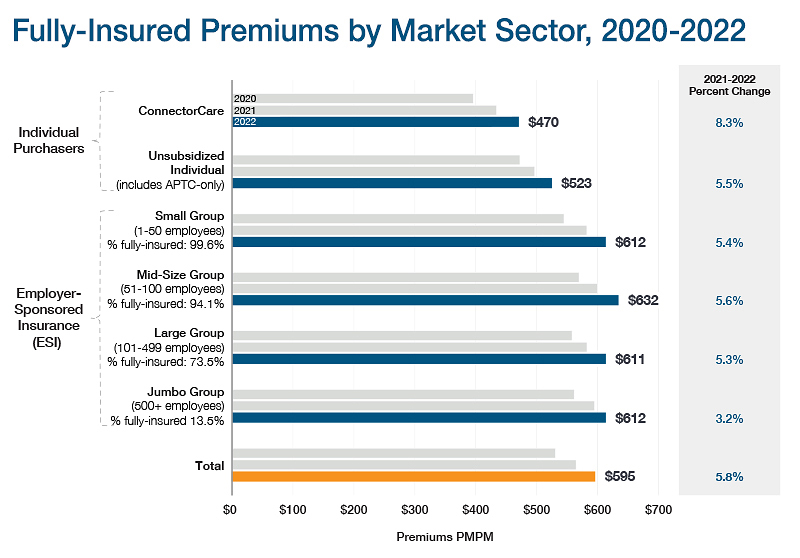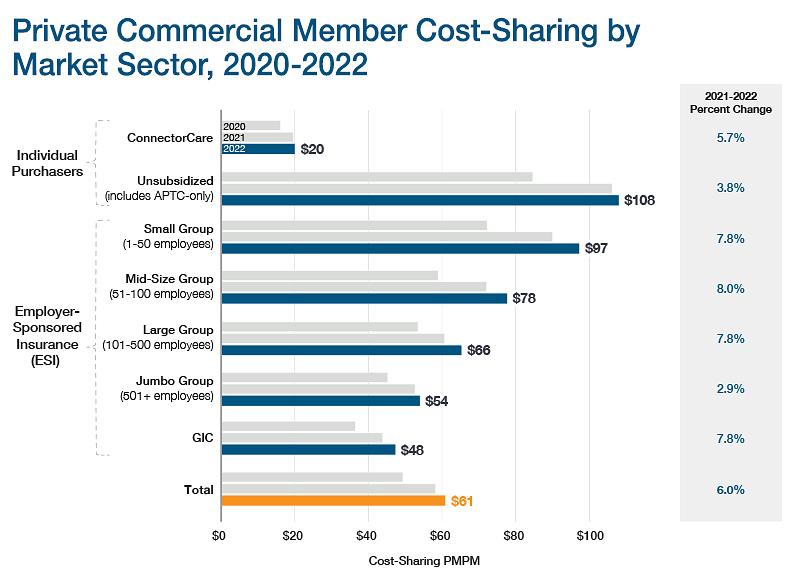Commercial Insurance: Premiums and Member Cost-Sharing
Key Annual Report
Commercial Insurance Premiums Finding
(Click to enlarge)
Key Annual Report
Member Cost-Sharing Finding
(Click to enlarge)
CHIA collects annual commercial health insurance premiums data from health care payers, allowing for insights into the costs borne by both Massachusetts employers and employees. CHIA also monitors high deductible health plan enrollment and consumer cost-sharing over time. These measures are reported in CHIA's Annual Report on the Performance of the Massachusetts Health Care System.
Commercial Insurance Premiums
Commercial Insurance Premiums are costs borne by the majority of individuals under 65 years old, both in Massachusetts and nationally. These individuals are usually enrolled in employer sponsored insurance, where both the employer and the employee make premium contributions to a commercial payer for an employee’s health plan. Health care payers use the premiums to pay for their member's medical expenses. Payers also retain a portion of the premium to cover administrative expenses, reserves, commissions, contributions to surpluses and profits, premium taxes, and medical management expenses.
Note that health insurance premiums are set prospectively based on historical data and projected growth in claims and administrative costs. This means that premium rates for plans active in 2022 were developed using data from 2019 and 2020 to account for the uncertainty in trends caused by the COVID-19 pandemic. In Massachusetts, payers are required to meet minimum medical loss ratio (MLR) thresholds of at least 88% in the merged market and 85% for larger employer plans. These requirements serve as guardrails to keep health plan administrative costs in check, especially in years when claims costs come in below actuarial projections.
Commercial Insurance Member Cost-Sharing
Commercial Insurance Member Cost-Sharing includes all medical expenses allowed under a member’s plan but not paid for by the payer, employer, or state Cost Sharing Reduction (CSR) subsidies (e.g., deductibles, copays, and co-insurance). CHIA reports on member cost-sharing by market sector, product type (HMO, PPO, POS), funding type, and benefit design type (HDHP, tiered network, limited network).
Cost-sharing and affordability data are also included in findings from CHIA’s Massachusetts Health Insurance Surveys (MHIS). The survey findings reflect the impacts of medical costs on Massachusetts households with all forms of insurance coverage (including private commercial, MassHealth, and Medicare) as well as the uninsured.
Please note: Figures in CHIA's Annual Report include members who incurred little to no medical costs as well as those who may have experienced substantial medical costs. They do not include out-of-pocket payments for goods and services not covered by the members’ health insurance policies (e.g., over-the-counter medicines, standalone vision and dental care). Member cost-sharing does not account for employer offsets, such as health reimbursement arrangements or health savings accounts.
Key Premiums and Member Cost-Sharing Findings
from CHIA's Annual Report on the Performance of the Massachusetts Health Care System (March 2024)
-
Within the commercial market, fully-insured premiums increased by 5.8%, with the mid-size employer group sector (51-100 employees) reporting the fastest growth rate and highest premiums among employer-sponsored plans.
-
Between 2021 and 2022, member cost-sharing increased 6.0% to $61 PMPM for Massachusetts commercial contract members, after cost-sharing rates fluctuated during the pandemic due to volatile utilization.


